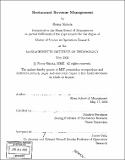| dc.contributor.advisor | Dimitris Bertsimas. | en_US |
| dc.contributor.author | Shioda, Romy, 1977- | en_US |
| dc.contributor.other | Massachusetts Institute of Technology. Operations Research Center. | en_US |
| dc.date.accessioned | 2005-09-26T19:22:04Z | |
| dc.date.available | 2005-09-26T19:22:04Z | |
| dc.date.copyright | 2002 | en_US |
| dc.date.issued | 2002 | en_US |
| dc.identifier.uri | http://hdl.handle.net/1721.1/28250 | |
| dc.description | Thesis (S.M.)--Massachusetts Institute of Technology, Sloan School of Management, Operations Research Center, 2002. | en_US |
| dc.description | Includes bibliographical references (p. 59-60). | en_US |
| dc.description.abstract | We develop two classes of optimization models in order to maximize revenue in a restaurant, while controlling average waiting time as well as perceived fairness, that may violate the first-come-first-serve (FCFS) rule. In the first class of models, we use integer programming, stochastic programming and approximate dynamic programming methods to decide dynamically when, if at all, to seat an incoming party during the day of operation of a restaurant that does not accept reservations. In a computational study with simulated data, we show that optimization based methods enhance revenle relative to the industry practice of FCFS by 0.11% to 2.22% for low load factors, by 0.16% to 2.96% for medium load factors, and by 7.65% to 13.13% for high load factors, without increasing and occasionally decreasing waiting times compared to FCFS. The second class of models addresses reservations. We propose a two step procedure: use a stochastic gradient algorithm to decide a priori how many reservations to accept for a future time and then use approximate dynamic programming methods to decide dynamically when, if at all, to seat an incoming party during the day of operation. In a computational study involving real data from an Atlanta restaurant, the reservation model improves revenue relative to FCFS by 3.5% for low load factors and 7.3% for high load factors. | en_US |
| dc.description.statementofresponsibility | by Romy Shioda. | en_US |
| dc.format.extent | 60 p. | en_US |
| dc.format.extent | 2701335 bytes | |
| dc.format.extent | 2706912 bytes | |
| dc.format.mimetype | application/pdf | |
| dc.format.mimetype | application/pdf | |
| dc.language.iso | en_US | |
| dc.publisher | Massachusetts Institute of Technology | en_US |
| dc.rights | M.I.T. theses are protected by copyright. They may be viewed from this source for any purpose, but reproduction or distribution in any format is prohibited without written permission. See provided URL for inquiries about permission. | en_US |
| dc.rights.uri | http://dspace.mit.edu/handle/1721.1/7582 | |
| dc.subject | Operations Research Center. | en_US |
| dc.title | Restaurant revenue management | en_US |
| dc.type | Thesis | en_US |
| dc.description.degree | S.M. | en_US |
| dc.contributor.department | Massachusetts Institute of Technology. Operations Research Center | |
| dc.contributor.department | Sloan School of Management | |
| dc.identifier.oclc | 50882039 | en_US |
